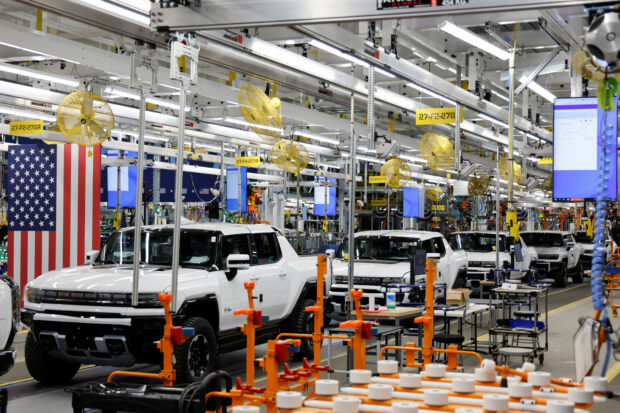US aims to ensure local EV maker success as China boosts exports

Hummer EV are seen on the production line as U.S. President Joe Biden tours the General Motors ‘Factory ZERO’ electric vehicle assembly plant, in Detroit, Michigan, U.S. Nov 17, 2021. REUTERS/Jonathan Ernst/File photo
ELIZABETHTOWN, Kentucky — U.S. Treasury Secretary Janet Yellen on Wednesday said President Joe Biden’s administration is taking steps to ensure success of the domestic electric vehicle (EV) industry in the face of China’s growing exports in the sector and heavy government subsidies.
Asked whether the United States needs new tariffs on Chinese EVs, Yellen told reporters at a new battery materials plant in Kentucky: “I don’t want to get ahead of where we are, but it is a commitment that President Biden has made … that we’re going to want our domestic industry to be successful.”
As Chinese demand flags at home amid economic turmoil, its growing exports of EVs to global markets have raised alarm bells in Washington over the potential to inflict harm on U.S. automakers, just as its excess capacity in steel and aluminum decimated U.S. metals producers in past decades.
READ: BYD overtakes Tesla as world’s top EV maker
Current U.S. tariffs of 25 percent on all Chinese vehicles imposed by former President Donald Trump effectively keeps Chinese EVs out of the U.S. market for now. But China’s largest producer, BYD, has started to export to Mexico and is scouting locations for a Mexican factory.
Some U.S. senators have urged the Biden administration to increase tariffs on Chinese EVs further.
Probe of Chinese vehicle imports
The U.S. Commerce Department has opened a probe into whether Chinese vehicle imports pose national security risks because of the data they transmit, an effort that could lead to additional restrictions on both EVs and conventional cars and trucks.
Another avenue for higher U.S. trade restrictions on Chinese EVs would be a long-running review of the Trump tariffs on hundreds of billions of dollars worth of Chinese imports being conducted by the U.S. Trade Representative’s office.
READ: China’s BYD rides on partnerships to expand EV sales in Southeast Asia
Yellen and other administration officials have called for those “Section 301” tariffs to be made more “strategic” to better protect industries important to U.S. economic security while lowering costs elsewhere.
“It is true that China is investing very massively in this industry and the United States is taking steps to ensure that our industry is successful,” Yellen said, without specifying such actions.
Dependence on Chinese supply chains
A key objective of the 2022 Inflation Reduction Act clean energy incentives, Yellen said, was to cut U.S. dependence on Chinese supply chains for batteries, and associated minerals and components.
Provisions including “foreign entity of concern” rules will make it increasingly difficult for U.S. made EVs to include Chinese content and still qualify for consumer purchase tax credits of $7,500.
Yellen said the U.S. approach aimed to balance “both climate goals and also concern about jobs and having meaningful presence in industries that are going to be driving our economy.”